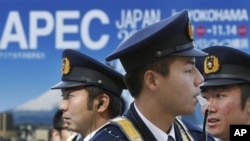A multilateral free trade agreement and global economic imbalances will be at the top of the agenda when national leaders gather at the Asia Pacific Economic Cooperation summit later this week. APEC ministers already have begun laying the groundwork for those discussions.
Japanese Foreign Minister Seiji Maehara on Wednesday urged trade and foreign ministers gathered in Yokohama to focus on trade liberalization.
He says what is important in economic diplomacy is the promotion of free trade. As the Asia-Pacific region takes a bigger role in the world economy, Maehara says, he would like to work with the delegates to build a freer economic and trade framework.
Japan is the host of this year's Asia Pacific Economic Cooperation summit, and there is increasing pressure for Tokyo to commit to a free trade agreement.
Nine APEC countries, including the U.S. and Australia, hope to adopt a trade agreement through the Trans-Pacific Partnership. It proposes eliminating tariffs on goods from all nations involved within 10 years.
Japan has never signed a multilateral trade pact but international relations Professor Takashi Terada with Tokyo's Waseda University says the country must take a leadership position on the issue.
"A couple of the nations want to see more agriculture liberalization in Japan," Terada says, "The negotiations should be tougher. Japan, in particular the agriculture sector, is putting a lot of pressure on the government to not participate in it."
Prime Minister Naoto Kan has already pushed forward with trade discussions, but he faces tough opposition from farmers concerned a deal could increase competition and drive down prices.
In parliament this week, Mr. Kan lobbied for support on the discussions.
He says Japan has fallen behind in the past decade, as other countries have pushed for free trade. He says he feels like open trade, along with a domestic push to revive the agriculture sector is critical.
Mr. Kan also expected to discuss global economic imbalances with fellow leaders - following discussions at the G20 summit in Seoul.
The U.S. wants G20 countries to reduce trade imbalances to 4 percent of their gross domestic product.
The economic discussions come as political tensions between Japan and China continue to fester. Japan arrested a Chinese fishing boat captain in September, after his ship rammed into a Coast Guard vessel off disputed islands Tokyo controls. China and Taiwan dispute Japan's claims to the islands.
Wednesday the Japanese government said it had arrested a Coast Guard official for posting a video of the collision with the fishing boat.
The Ministry of Foreign Affairs says that there are no plans for a Japan-China meeting at APEC, as of now.
Terada says he is not optimistic about the prospects for talks, but he does not expect bilateral tensions to stall trade discussions with other countries. "Both nations, it seems to me have tried to avoid bringing bilateral problems into such a multilateral framework," he said.
World leaders from all 21 APEC nations, including President Barack Obama, meet here on Saturday.
APEC Ministerial Meetings Kick Off Trade Discussions













